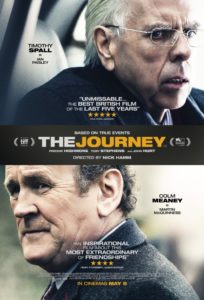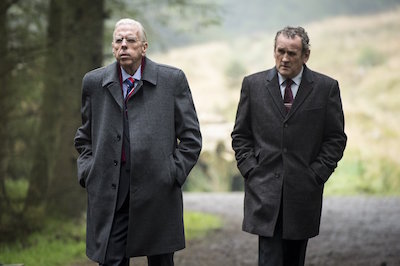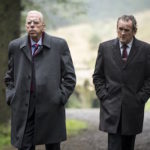Nick Hamm’s The Journey is not a typical biopic or historical drama. Many of these films fail with the viewer immediately questioning the movie’s verisimilitude and taking to the internet, The Journey makes it clear in the prologue that it is not concerned with the truth, so much as it is setting out to tell a good story.

The
Journey takes place during the St. Andrews Peace Talks, which were held in Scotland by the British and Irish governments, along with political leaders from opposing sides of civil war-torn Northern Ireland to come to an agreement and bring peace to the region. Ian Paisley (Timothy Spall) and Martin McGuinness (Colm Meaney) are fierce political rivals, however when Paisley must take his leave from the talks to attend his own fiftieth wedding anniversary, McGuinness offers to travel with him as an act of good faith. As the two of them travel to the airport, British Prime Minister Tony Blair (Toby Stephens) and the head of MI-5 (John Hurt) hatch a plan to get the two of them to talk out their differences and become friends—and, apart from the St. Andrews Agreement, none of this happened.A title card shown during the prologue says, of Paisley and McGuinness, “These extremists were polar opposites, who had never previously spoken—but were forced by circumstance or fate to make a historic journey together.” Following this is another title card that bears the movie’s thesis statement: “This story imagines that journey.” During the prologue, we also see images not of the film’s stars, but of the actual Paisley and McGuinness. Unlike many docudramas, which opt to show the real-life versions of the characters depicted within the film at the end, this film wants to make it perfectly clear that you are watching something created for the screen to entertain. Unfortunately, it’s just not all that entertaining.

Colm Meaney (right) and Timothy Spall in “The Journey.” Photo by Steffan Hill – © Steffan Hill 2015.
Spall and Meaney are seasoned veterans, capable of elevating any screenplay with commanding presence and impeccable delivery, but their talents and what they are working with are at odds; they are phenomenal but the dialogue is merely passable. This is also true of the late John Hurt, who somehow manages to make an elderly British intelligence expert who acts like a wingman in a high school romantic comedy likable (no small task, I can assure you). In addition to this, the story, which I will admit again say is brave and creative in its dismissal of actual events, takes some seriously goofy turns, when it easily could have been more grounded and worked much better.
At the end of the day, the idea of portraying a fictionalized version of a real-life event is an attractive one. It’s like an alternated timeline where the same result was achieved, only by different means. But, with the true story of the St. Andrews Agreement being—by all accounts—very interesting already, is there a point in The Journey existing at all, other than to show just how good Meaney and Spall continue to be that is?
WHERE TO WATCH: (powered by JustWatch)

| Producer: | Nick Hamm, Mark Huffam, Piers Tempest |
| Release Date: | June 16th, 2017 |
| Starring: | Timothy Spall, Colm Meaney, John Hurt, Freddie Highmore, Toby Stephens |
| User Rating: | |
| Writer: | Colin Bateman |
| MPAA Rating: | PG-13 |
| Director: | Nick Hamm |
| Distributor: | IFC Films |
| External Info: | Official Site |
